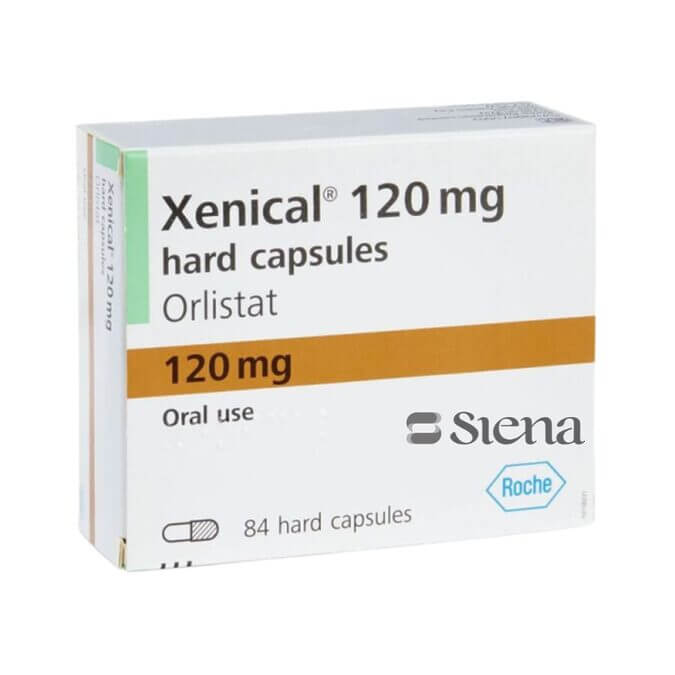Xenical It is an old and well-known drug that helps with weight loss. Many people come across this name when they are looking for solutions to problems with being overweight or obese. But what actually stands behind Xenical and how does it help achieve results? In this comprehensive article, we will explain in depth about Orlistat, the active ingredient in the drug, its mechanism of action, who it is suitable for, and we will also discuss possible side effects and how to properly use the drug. In addition, we will provide frequently asked questions (FAQ) that will clear up any doubts and review current and relevant information in the field.
Introduction: What is Xenical (Xenical / Orlistat)?
Background on Orlistat
Orlistat is the active ingredient found in In the drug Xenical And also in other products such as Alli. It was specifically developed to help reduce fat absorption in the body, thus allowing people who want to lose weight to receive additional help beyond diet and exercise.
In fact, the trade name "Xenical" is very common worldwide. On the other hand, the generic name "Orlistat" refers to the medicinal compound itself. The drug has been in use for many years, and is considered one of the oldest prescription drugs in the field of weight loss treatment.
A weight loss drug that works on the digestive system
Xenical for weight loss works locally in the digestive system. The drug is not absorbed into the bloodstream but works on the enzymes that break down fat in the intestine. As a result, some of the fats a person eats are not absorbed by the body and are excreted in the feces. This method is different from other weight loss drugs (for example, Ozempic or VigRX), which directly affect the brain or hormone receptors.
Xenical 120 mg vs. Alli (60 mg)
The drug Xenical (120 mg) is marketed by prescription only. On the other hand, there is also a product on the market called Alli (60 mg), which also contains orlistat but in a lower dose. In various countries, it can be purchased without a prescription. In Israel, currently, it is important to check whether Alli is freely available or requires some kind of approval. In any case, before starting treatment with any of the preparations, it is recommended to consult a doctor or pharmacist.
Who is Xenical used for? (Main indications)
Treatment of obesity and overweight with risk factors
Xenical is primarily intended for people struggling with obesity (BMI of 30 or higher). In some cases, orlistat is also suitable for people with a BMI of 27 or higher, provided that they suffer from associated risk factors such as type 2 diabetes, high blood pressure or cholesterol problems (dyslipidemia). The combination of the drug with a reduced-calorie diet and exercise offers a solution for those who need an extra push on the way to weight loss.
Part of a comprehensive plan
It is important to remember that Xenical is not a "magic bullet." It should be used as part of a comprehensive program that includes dietary changes, exercise, and overall healthier behavior. Without adopting the right habits, the drug's effect may be less, and the chance of regaining weight after stopping treatment increases.
Preventing weight gain again
Another goal of using Xenical is to maintain the weight gained after initial weight loss. Sometimes, people lose weight through a diet and exercise program, but over time, discipline and habits weaken. In such situations, treatment with Orlistat can help reduce fat absorption and prevent weight gain.
How does Xenical work?
Inhibition of lipases in the digestive system
The basis of orlistat's mechanism of action is the inhibition of lipase enzymes in the intestine. Lipases are enzymes that break down fats from food into fatty acids that can be absorbed by the body. When Xenical is taken, it binds to these enzymes and temporarily neutralizes them. Therefore, a significant portion of the fat consumed (up to about 30%) is not broken down and is not absorbed into the bloodstream. Instead, the remaining fat is excreted through the feces.
Orlistat is not absorbed into the bloodstream.
Unlike other drugs that act on the nervous system or hormone receptors, Xenical remains largely in the digestive tract. It does not enter the bloodstream in large quantities. This fact explains why the side effects that characterize the use of Xenical are concentrated mainly in the digestive tract and do not significantly affect other body systems.
How long does it take to see results?
Orlistat begins to affect fat absorption almost immediately. From the first meal after taking the capsule, some of the fat will not be absorbed. However, the weight loss itself occurs gradually and not overnight. In many cases, within a few weeks of combined use with a reduced-fat diet, a decrease in the feeling of heaviness is observed, and then more significant changes in body weight come. A decrease of 5–10% in body weight may occur within six months of regular treatment.
Dosages and instructions for taking
Xenical 120 mg: Common dosage
The usual dose for Xenical is 120 mg three times a day. The capsule is taken with a meal or up to an hour after a meal containing fat. If the meal contains no fat at all, it is not necessary to take the medication with the same meal (Xenical Instructions for Use). This prevents an unnecessary dose that may cause unnecessary digestive symptoms.
Alli (60 mg) over the counter
There is also a low-dose preparation (Alli, 60 mg). In some countries, Alli can be purchased without a prescription (Xenical without a prescription). However, even in this case, it is worth consulting a doctor, coordinating expectations, and making sure that there is no conflict with other medications.
Taking fat-soluble vitamins
Because orlistat prevents fat absorption, it may also impair the absorption of fat-soluble vitamins such as A, D, E, and K. Therefore, it is recommended to take a multivitamin or fat-soluble vitamin supplement at least two hours before or after taking Xenical (orlistat dosage). This way, the level of vitamins in the blood is maintained and the body does not enter a prolonged deficiency.
Adherence to a reduced-fat diet
Xenical is particularly effective when you eat a moderate amount of fat at each meal. The higher the fat intake, the greater the gastrointestinal side effects. The advantage of the drug is that it "educates" users to consume less fat, because too much of it leads to significant discomfort.
Side effects of Xenical
Common side effects
Most of the side effects are related to the fat not being absorbed and leaving the body through the digestive system. These include:
- Fatty or oily stools.
- Gas accompanied by fatty secretions.
- Urgency in passing stool (difficulty holding back).
- Intermittent abdominal pain and diarrhea.
These symptoms are sometimes called "behavioral symptoms" because they discourage people from consuming too much fat. When fat intake is restricted, these symptoms occur less frequently and with less intensity.
Less common but important side effects
In addition to the common side effects, there are very rare reports of liver damage (nadir). There are also reports of kidney stones in some users. However, these side effects do not occur very frequently, and the drug is generally considered safe to use when taken at the correct dosage and for a specified period of time.
Xenical side effects: relationship to the amount of fat in food
It is important to understand that the risk of unpleasant digestive symptoms is largely related to the amount of fat in the meal. If you have followed a low-fat diet, side effects such as fatty stools or flatulence with fatty secretions will be less common. On the other hand, if you consume a lot of foods rich in fat, the risk of experiencing these symptoms increases significantly.
Discontinuation of Xenical treatment
Is Xenical addictive?
Xenical is not considered an addictive drug. It does not act on nerve receptors and does not create physiological dependence. Many people tend to use it for a limited period of time to lose weight, then stop when they reach their desired goal or when they continue to treat their weight through other means (e.g., dietary changes and exercise).
What happens when you stop?
When you stop using Xenical (Xenical side effects may disappear), the normal absorption of fats returns. Those who do not maintain a balanced diet may experience gradual weight gain. Therefore, the recommendation is to continue maintaining a healthy lifestyle even after stopping treatment. It should be remembered that the drug works as a "blocker" for fat absorption, but as soon as the "blocker" is removed, the body returns to its normal path.
Interactions with other drugs and alcohol
Xenical and alcohol
In principle, there is no direct medical interaction between Xenical and alcohol (Xenical and alcohol). However, alcohol consumption may increase daily calorie intake and also cause an increase in appetite. Alcohol may impair judgment when choosing foods, and in turn lead to higher fat intake. Therefore, even if there is no blanket restriction, it is recommended to limit alcohol consumption as part of a weight loss plan.
Interactions with blood thinners and diabetes medications
People taking blood-thinning medications, such as Warfarin, should consult a doctor before starting treatment. Long-term vitamin K deficiency may affect the clotting mechanism and alter the level of blood thinning.
Also, diabetics who are taking blood sugar-lowering medications or insulin may need their dosage adjusted if they start taking Xenical. Weight loss sometimes improves the body's sensitivity to insulin.
Interaction with levothyroxine (Eltroxin)
For people with thyroid problems (taking levothyroxine – for example, Eltroxin), it is important to separate the time of taking the drug Maxanical. It is recommended that a gap of several hours be between taking the two drugs. The reason for this is that the dose of thyroid hormone may be affected if it is taken together with drugs that act on the digestive system, including orlistat.
Additional frequently asked questions about Xenical
In recent years, more and more questions have been added among those looking for an effective way to lose weight. Below is a collection of frequently asked questions, which hopefully will answer a wide range of questions.
Xenical during pregnancy and breastfeeding
Is it permissible to take Xenical during pregnancy? The answer is no. The drug is not recommended for use during pregnancy or while breastfeeding, as there is not enough information about its effects that may be passed on to the fetus or baby. In any case of planning a pregnancy, it is best to consult a doctor in advance and discontinue treatment.
Xenical price and Xenical generic
Many people ask about "Xenical price" or about the participation of health insurance funds (for example, Xenical Clalit). The price may vary depending on the medical insurance track and the insurance coverage that each person has. There are funds that provide certain reimbursements to those who meet the criteria for obesity with concomitant diseases. It is recommended to check this with the health insurance fund or with the pharmacist at the pharmacy.
How much does it cost to lose weight with Xenical?
This is one of the popular questions (how much do you lose with Xenical). The answer is not clear-cut. On average, studies show that people who use Xenical along with a reduced-calorie diet and moderate exercise may lose between 5% and 10% of their weight over a period of six months to a year. Results may vary depending on diet adherence, amount of fat consumed, and overall lifestyle.
Comparison of Xenical with other weight loss drugs
There are many medications available in the world that help with weight loss. For example, Ozempic, Wegovy, and Mounjaro. These medications are based on hormonal mechanisms (GLP-1, for example), and have a different side effect profile. Xenical (for weight loss), on the other hand, focuses primarily on preventing fat absorption. The choice of medication depends on the patient's preferences, health profile, lifestyle, and medical advice.
Is Xenical dangerous?
Xenical (orlistat) is generally considered safe for long-term use. However, as with any medication, side effects are possible, so it is important to use it correctly and as directed by your doctor. Medical monitoring is required for long-term use, especially in people with other medical conditions (such as diabetes or liver and kidney disease).
Xenical in pharmacies
Xenical 120 mg is available in pharmacies with a doctor's prescription. Anyone searching for "Xenical in pharmacies" without a prescription will find that it currently requires medical approval in Israel. If you encounter a party offering to purchase the drug without a prescription, it is worth making sure that it is a trusted and reliable source, as counterfeit products may be dangerous.
Criteria for the success of Xenical treatment
To achieve optimal results and get the most out of using Xenical, it is recommended to adhere to a number of basic principles.
- Limiting daily fat intake: Because orlistat prevents fat absorption, it is a good idea to limit the amount of fat in your daily diet. Too much fat intake can cause stomach discomfort, diarrhea, and oily discharge.
- Balanced nutrition plan: In addition to reducing fat, it is important to enrich the diet with vegetables, fruits, lean proteins, and whole grains. This ensures the body has an adequate supply of essential nutrients.
- Regular physical activity: Exercise can improve metabolic rate, increase muscle mass, and contribute to weight loss. Combining regular exercise with Xenical will yield better results than using the drug alone.
- Progress measurement and blood testsIt is advisable to perform weight and circumference measurements every few weeks, and conduct periodic blood tests to examine blood lipid levels and liver function.
- Medical monitoring: Stay in touch with your doctor, especially if you are taking other medications such as blood thinners or diabetes medications. You may need to adjust your dosage based on changes in weight or vitamin absorption.
Orlistat vs. other weight loss drugs
As mentioned, there are many medications on the market for the purpose of weight loss. It is important to understand the differences between orlistat and medications that act on hormones or the central nervous system.
- GLP-1 group: Such as Ozempic, Vigoby, Monjero, and more. They act on the brain to suppress appetite and control blood sugar levels.
- Classic appetite suppressants: Directly affect appetite mechanisms in the brain.
Orlistat (what is orlistat) works, as mentioned, by reducing fat absorption in the intestine, which may indirectly cause people to consume less fat in order to avoid the troublesome side effects.
The advantage of orlistat is that it does not directly affect the brain, so the side effect profile is different and tends to be more focused on the gastrointestinal tract rather than having a widespread systemic effect. In contrast, some users of appetite suppressants report increased heart rate, increased blood pressure, or other effects that are not typically present with orlistat use.
orlistat reviews and long-term success
In the medical literature and on various online forums, you can find orlistat reviews. Many note that it helps reduce the amount of fat eaten. However, some users have difficulty maintaining long-term use due to digestive discomfort. This depends on the degree of desire and willingness to maintain a low-fat diet over time.
Long-term success is closely linked to adopting a healthy lifestyle. If you use Xenical for a short time and see results, but then return to a lifestyle that includes high fat and calorie intake, the results may quickly fade. Real treatment is achieved by changing lasting habits - Xenical is a tool to help you implement them.
General instructions for use (Xenical instructions for use)
- Recommended dosage: 120 mg (one capsule) three times a day with a meal or up to an hour after it.
- Meal frequency: The capsules are usually taken with main meals (breakfast, lunch, dinner). If there is another meal that contains fat, an additional dose may be considered as directed by the doctor.
- Drinking water: Drink enough water throughout the day. Also, be sure to take fat-soluble vitamins about two hours apart from the medication, so as not to impair their absorption.
- Dose adjustment: Some people decide to skip the dose at certain low-fat meals. However, consult a doctor before changing your routine to avoid nutritional deficiencies or unwanted reduction in treatment results.
- Warnings and restrictions: Xenical should not be taken at the same time as certain medications (such as drugs to prevent transplant rejection) without approval. It is also recommended to avoid taking levothyroxine with Xenical at the same time.
Complementary therapies and weight loss support
Beyond taking Xenical or other prescription medications, there are complementary steps that may increase the effectiveness of treatment.
- Professional supportNutritional support and psychological counseling can help overcome negative eating habits and maintain weight over time.
- Support groups: Joining weight loss groups or workshops can provide motivation and sharing of experiences. This way you can learn effective strategies from people in a similar situation.
- Self-monitoring: Using a diet management app or food diary can help monitor fat intake. This prevents overconsumption, which can interfere with the effect of orlistat.
- Meal planning: It is worth preparing in advance, preparing balanced meals, and reducing the tendency to "binge" on high-fat processed foods between planned meals.
Xenical without a prescription?
Some people try to obtain "Xenical over the counter" through various sources on the Internet. Although Alli (60 mg) does not require a prescription in some countries, caution should be exercised: counterfeit drugs or unclear additives may endanger health. It is best to consult a family doctor or dietitian for proper guidance and personalized medication therapy.
Combining Xenical with a healthy lifestyle
Ensuring balanced meals
Although Xenical reduces fat absorption in the body, it is recommended not to exempt ourselves from overall nutritional thinking. A balanced diet that includes vegetables, fruits, lean protein (such as skinless chicken and turkey, lean fish, eggs, and the like) and whole grains is essential for maintaining a healthy weight and overall health.
Minimizing processed and fried foods
Processed foods high in trans fats, sugars, and preservatives not only weigh on your body weight, but also on your entire metabolic system. Along with Xenical, high fat intake will often cause discomfort. Therefore, it is best to stay away from fatty snacks, cold cuts, high-fat cheeses, and foods fried in large amounts of oil.
Emphasis on physical activity
– Increasing endurance: Incorporate walking, jogging, or swimming several times a week.
– Muscle strengthening: It is recommended to do resistance training, weights or strength classes.
– Flexibility and releaseYoga or Pilates help keep the body flexible and prevent pain and inflammation.
Physical exercise not only speeds up calorie burning, but also improves mood and reduces stress – a factor that can lead to emotional eating.
What do the studies say?
There are many clinical studies on Xenical (orlistat) in the scientific literature. Most studies agree that the drug contributes to moderate weight loss when used in combination with a low-calorie, relatively low-fat diet. The percentage of people who manage to lose 51% or more of their weight is significantly higher among those taking Xenical than among those who do not take the drug at all. However, it should be noted that the improvement is achieved alongside continued adherence to balanced eating habits.
Impact on metabolic health
In addition to weight loss, the use of Xenical may lead to improvements in cholesterol, triglycerides, and blood pressure. It can also help better balance blood sugar levels for type 2 diabetics. These changes provide a broad benefit, not just a drop in weight.
Recommended external links
- The US FDA website about Orlistat – Official information about the safety and effectiveness of the drug.
- Mayo Clinic website – Comprehensive and reliable medical explanations about types of weight loss medications and how to use them.
These two sources provide up-to-date and objective information about Xenical and other medications for the treatment of obesity.
Frequently Asked Questions (FAQ)
1. What is the difference between Xenical (120 mg) and Alli (60 mg)?
Xenical at a dose of 120 mg requires a doctor's prescription, while Alli (60 mg) is available in some countries without a prescription. Both contain the active ingredient orlistat, but in different doses.
2. Is it possible to lose weight just with Xenical without changing your diet?
This is not recommended. Xenical is more effective when combined with a reduced-calorie diet and exercise. Without dietary changes, side effects may be more severe, and weight loss may be limited.
3. How long can Xenical be used continuously?
Xenical can be used for a long period of time, although doctors usually recommend monitoring every few months. It is recommended to remain under medical supervision and periodically check vitamin levels, liver function, and blood lipids.
4. Is Xenical addictive?
No. The drug does not affect brain mechanisms associated with addiction. Discontinuation of treatment is not accompanied by withdrawal symptoms, but weight gain may occur again if unbalanced eating habits are resumed.
5. What should I do if I take too many capsules in one day?
In case of accidental overdose, consult a doctor or pharmacist. In most cases, significant gastrointestinal discomfort may occur, but it is difficult to reach a dangerous level of toxicity. In any case, the instructions listed in the consumer leaflet should be followed.
6. Are there any long-term side effects?
According to research, there is no evidence of serious and lasting harm from using the drug under proper medical guidance. However, vitamin deficiencies may accumulate over time, so it is recommended to take a multivitamin supplement.
7. Does Xenical cause urgent bowel movements?
Yes, there may be a phenomenon of urgency in passing stool, especially after consuming fatty foods. In extreme cases, people fear unpleasant accidents, but in most cases the phenomenon is well controlled if one maintains a moderate intake of fat.
8. What should I do if I forgot to take a capsule during a meal?
The capsule can be taken within an hour of finishing a meal. If more time has passed, you can wait until the next meal that will contain some fat. There is no need to "top up" with two capsules at the next meal.
9. Does Xenical also affect carbohydrates and proteins?
No. It mainly blocks the breakdown of fats. Carbohydrates and proteins continue to be absorbed as usual, so it is recommended to continue to monitor the total daily calories.
10. Can I drink alcohol while using Xenical?
There is no absolute medical restriction on alcohol. However, alcohol is high in calories and may lead to less healthy food choices. Therefore, limited alcohol consumption is preferable in order to maintain the results of treatment.
Summary
Xenical offers an effective solution for people who are obese or overweight. The drug works by inhibiting lipase enzymes in the digestive system and prevents the absorption of some of the fat consumed. This mechanism of action distinguishes it from other drugs that act on appetite or the nervous system. Xenical 120 mg is available in Israel only with a doctor's prescription, while Alli 60 mg may be sold without a prescription in some countries.
The use of Xenical carries side effects that are mainly focused on the digestive system, such as oily stools, gas, and urgency to defecate. Fortunately, these effects increase as fat intake in meals increases, and become milder when fat is limited to a reasonable minimum. Orlistat is not significantly absorbed by the body, so the main problem is the lack of absorption of fat-soluble vitamins over time.
To get the most out of the treatment, it is recommended to combine it with a balanced diet and exercise. It is important to take vitamin supplements and undergo periodic medical monitoring. The drug helps to reach weight loss goals (between 5% and 10% on average), but this success depends on continuing to maintain healthy habits. When stopping Xenical, weight may return and be gained if you abandon your dietary and sports routine.
In conclusion, Xenical is a good tool for those who are struggling with overweight or obesity, and are interested in additional support beyond diet and exercise. It is not suitable for everyone, and a doctor should be consulted before starting use, especially for patients taking additional medications. When used correctly and according to instructions, it may lead to significant improvements in health indicators, reduce the risk of metabolic diseases and assist in gradual weight loss.

פרופ’ אלון גרין הוא מומחה לפסיכיאטריה קלינית ומחקר תרופתי, עם התמחות בפיתוח והתאמת תרופות מרשם למגוון מצבים נוירו-פסיכיאטריים. בעל ניסיון של למעלה מ־35 שנה בעבודה קלינית ואקדמית, וכיהן כמרצה ופרופסור אורח במספר אוניברסיטאות מובילות בארץ ובחו”ל. עמד בראש יחידות מחקר וטיפול בבתי חולים ציבוריים ומרכזים רפואיים מתקדמים. תחומי עיסוקו כוללים קשב וריכוז (ADHD), הפרעות חרדה והרגעה, דיכאון קליני והפרעות מצב רוח, וכן טיפולים תרופתיים תומכי דיאטה ואיזון מטבולי. משלב גישות מבוססות ראיות עם חדשנות פרמקולוגית, ופרסם עשרות מאמרים מקצועיים בכתבי עת מדעיים, תוך תרומה משמעותית להבנת מנגנוני פעולה של תרופות והשפעתן הקלינית.








